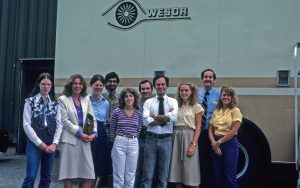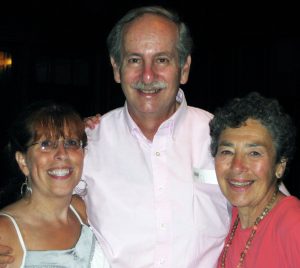Stacy Meuer, long-time DOVS researcher, has been honored with distinguished researcher emeritus status by the University of Wisconsin-Madison.
Barbara Klein, MD, MPH, professor, and Robert Golden, MD, dean of the UW School of Medicine and Public Health, recommended that Meuer be granted emeritus status in recognition of her contributions to the Department of Ophthalmology and Visual Sciences and UW. The honor was bestowed by Chancellor Rebecca Blank on February 17, 2021.
Meuer joined the department in 1980 as an office/field coordinator, assisting with the startup of the Wisconsin Epidemiologic Study on Diabetic Retinopathy (WESDR). WESDR was the first of two landmark epidemiologic studies led by Barbara Klein, MD, MPH, and the late Ronald Klein, MD, MPH, DOVS professors and researchers. Meuer worked with study doctors, incoming data, and outgoing results to study participants. In 1981, she began to split her time between the Klein Epidemiology Group and the Fundus Photograph Reading Center, training there as a grader, one who studies and screens retinal images for diabetic retinopathy.
In 1988, Meuer transitioned back to the Klein Epidemiology Group fulltime to work with the startup of the second landmark project, the Beaver Dam Eye Study. This study followed age-related eye diseases, including age-related macular degeneration, cataracts, glaucoma, and diabetic retinopathy, in a large population – everyone living in the city and township of Beaver Dam, Wisconsin, between 48 – 84 years of age. Since that time, Meuer has worked for the department as a grader and data manager/coordinator.
Throughout her career, Meuer particularly enjoyed teaching and training new graders that joined the Klein Epidemiology Research Group, as well as educating the hundreds of visitors who came to learn about the study protocols and techniques for successfully running a large population-based study across 35+ years and multiple examination phases.
One beloved memory involves the 40-foot-long van – a cherished story in the department’s history – that was purchased for the WESDR study from the state for $1.00. The WESDR study was on a very tight grant budget, and the Kleins paid a meager amount to repaint the outside and outfit the inside of the van for examinations. Early in the first examination phase, when the van was being moved to a new community, the driver had a small accident that crumpled the top corner of the rear roof. The insurance money from the small accident was used to purchase all of the lab testing kits for a new cutting-edge blood test that was just being explored: glycosylated hemoglobin, a measure of long-term blood sugar control. The data and results from the glycosylated hemoglobin tests went on to be one of the most important WESDR contributions at the time. While the van was never formally repaired, the accident was quite fortuitous in terms of research and contributions to public health.

Meuer credits her success directly to the support, encouragement and love of the Kleins. She notes that Ron and Barbara were generous with their time and knowledge and encouraged and mentored staff to further careers and explore hobbies with the opportunities available at UW.
“Thank you to everyone who stood beside me and guided me through this journey. I obviously wouldn’t have had the opportunities without Ron and Barbara as my bosses, mentors and friends. I will be forever grateful that they saw something in the wide-eyed 25-year-old that showed up as an LTE at the WARF building on September 2, 1980 — some 40+ years ago. Looking forward, I’m excited to continue with the DOVS at the Fundus Photograph Reading Center as a rehired annuitant.” – stacy meuer

Выберите правильные игры для игры
В зависимости от того, какой опыт вам интересен, в одни игры играть лучше, чем в другие. Вы действительно пинап казино хотите использовать навыки, чтобы попытаться выиграть немного денег? Или вы хотите расслабиться и потягивать бесплатные коктейли? Хотите почувствовать тяжесть фишек казино в своих руках? Или вы бы предпочли посмотреть на машину, демонстрирующую яркие эффекты и звуки?